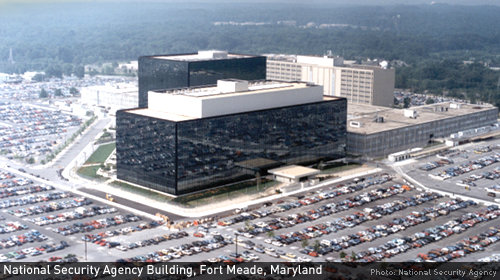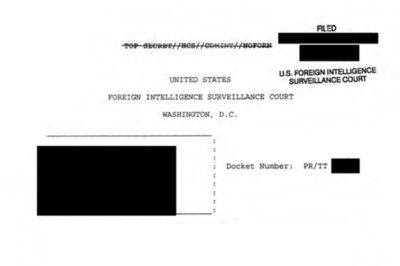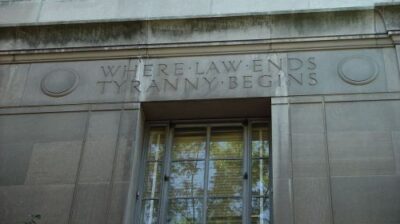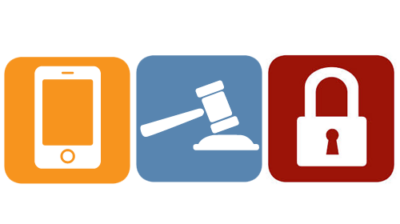
Ó◊” ”∆µv. United States
What's at Stake
The Ó◊” ”∆µhas filed three motions in the Foreign Intelligence Surveillance Court (FISC) asking it to release secret opinions authorizing the surveillance of Americans. The public has a right to see the legal decisions addressing novel surveillance programs that affect our privacy and free speech rights ‚Äî but many of the FISC‚Äôs opinions remained closely guarded secrets.
After the FISC and its appeals court rejected the ACLU‚Äôs public access arguments in a series of rulings, the Ó◊” ”∆µasked the Supreme Court to review those rulings and to recognize that the public has a First Amendment right of access to the FISC‚Äôs opinions.
Summary
We filed our first motion with the FISC in June 2013, after The Guardian a secret FISC — issued under Section 215 of the Patriot Act — authorizing the bulk collection of Americans’ call records. The disclosure was based on documents provided to The Guardian by the whistleblower Edward Snowden. The FISC order compelled a Verizon subsidiary to provide to the NSA call records for every phone call placed on its network during a three-month period. Four days later, we and Yale Law School’s Media Freedom and Information Access (MFIA) clinic filed a motion with the FISC requesting that it publish its opinions on the meaning, scope, and constitutionality of Section 215.
The Verizon call-records order, it emerged, belonged to a much larger surveillance program — covering all of the major telephone companies — that had secretly existed for nearly a decade. In the course of the national debate that followed the first disclosure, two things became clear: (1) the phone-records program was not the only bulk-collection surveillance program in which the NSA had engaged; and (2) the FISC opinions interpreting Section 215 are not the only secret court opinions addressing the lawfulness of bulk surveillance.
In November 2013, the Ó◊” ”∆µand the MFIA clinic filed a second motion, seeking to uncover the legal underpinnings of the government‚Äôs bulk collection of Americans‚Äô data more broadly. The second motion seeks opinions discussing the legal basis for the collection of records of our internet-usage history, location information, and other data or records collected under the Foreign Intelligence Surveillance Act (FISA). Some of these opinions and orders remain secret, and as a result, Americans still do not know enough about the authority the government has claimed to collect our information en masse.
In October 2016, the Ó◊” ”∆µfiled a third motion seeking the release of all FISC opinions containing ‚Äúnovel or significant interpretations‚Äù of law issued between 9/11 and the passage of the USA Freedom Act in June 2015. These rulings appear to address a range of novel surveillance activities, including:
- The government’s bulk searches of email received by Yahoo! customers
- The government’s use of malware, which it calls “Network Investigative Techniques”
- The government’s efforts to compel technology companies to weaken or circumvent their own encryption protocols
- The government’s efforts to compel technology companies to disclose their source code so that it can identify vulnerabilities
- The government’s use of stingray cell-phone tracking devices under the Foreign Intelligence Surveillance Act (FISA)
- The government’s warrantless surveillance of Americans under FISA Section 702 — a controversial authority which was reauthorized in January 2018
In March 2020, the FISC held that because it is a specialized court that deals with issues related to national security, the public has no First Amendment right to view its opinions — even major ones that affect fundamental liberties. Months later, both the FISC and its special court of appeals — the Foreign Intelligence Surveillance Court of Review (FISCR) — adopted an even more extreme position, holding that they lack jurisdiction even to consider First Amendment public access motions like the ones we filed.
On April 19, 2021, we and our co-counsel at the Knight First Amendment Institute at Columbia University, the MFIA clinic, and the law firm Gibson Dunn filed a petition for writ of certiorari in the Supreme Court, challenging these rulings and asking the court to recognize a First Amendment right of public access to the FISC’s opinions—ensuring that the opinions are released with only those redactions necessary to prevent genuine harm to national security.
The USA Freedom Act ended the NSA‚Äôs mass call-records program, and it also required the government to make significant FISC opinions public. But unfortunately, the government maintains that its obligation to release such opinions does not apply to secret court rulings that predate the USA Freedom Act. As a result, the Ó◊” ”∆µis seeking to vindicate the public‚Äôs constitutional right to access these key judicial decisions.
The public has a First Amendment right to judicial opinions interpreting laws like Section 215 and the rest of the Foreign Intelligence Surveillance Act. We can only have an informed debate about the wisdom and legality of these surveillance programs if we know what our courts have taken the law to mean and why.
Legal Documents
-
11/01/2021
Order Denying the Petition for a Writ of Certiorari, and Dissenting Opinion -
09/14/2021
Reply in Support of the Petition for a Writ of Certiorari -
08/27/2021
Government Opposition to the Petition for a Writ of Certiorari -
05/27/2021
Amicus Brief on behalf of Project for Privacy and Surveillance Accountability -
05/27/2021
Amicus Brief behalf of Reporters Committee for Freedom of the Press and 34 Media Organizations -
05/27/2021
Amicus Brief on behalf of Professor Stephen Vladeck -
05/27/2021
Amicus Brief on behalf of Microsoft Corporation -
05/27/2021
Amicus Brief on behalf of Former U.S. Magistrate Judges -
05/27/2021
Amicus Brief on behalf of the Brennan Center for Justice and Americans for Prosperity Foundation -
05/27/2021
Amicus Brief on behalf of Former Government Officials -
04/19/2021
Petition for a Writ of Certiorari
Date Filed: 11/01/2021
Court: Supreme Court Petition – Motion for the Release of Opinions Containing Novel or Significant Interpretations of Law – No. 20-1499
Date Filed: 09/14/2021
Court: Supreme Court Petition – Motion for the Release of Opinions Containing Novel or Significant Interpretations of Law – No. 20-1499
Date Filed: 08/27/2021
Court: Supreme Court Petition – Motion for the Release of Opinions Containing Novel or Significant Interpretations of Law – No. 20-1499
Date Filed: 05/27/2021
Court: Supreme Court Petition – Motion for the Release of Opinions Containing Novel or Significant Interpretations of Law – No. 20-1499
Date Filed: 05/27/2021
Court: Supreme Court Petition – Motion for the Release of Opinions Containing Novel or Significant Interpretations of Law – No. 20-1499
Date Filed: 05/27/2021
Court: Supreme Court Petition – Motion for the Release of Opinions Containing Novel or Significant Interpretations of Law – No. 20-1499
Date Filed: 05/27/2021
Court: Supreme Court Petition – Motion for the Release of Opinions Containing Novel or Significant Interpretations of Law – No. 20-1499
Date Filed: 05/27/2021
Court: Supreme Court Petition – Motion for the Release of Opinions Containing Novel or Significant Interpretations of Law – No. 20-1499
Date Filed: 05/27/2021
Court: Supreme Court Petition – Motion for the Release of Opinions Containing Novel or Significant Interpretations of Law – No. 20-1499
Date Filed: 05/27/2021
Court: Supreme Court Petition – Motion for the Release of Opinions Containing Novel or Significant Interpretations of Law – No. 20-1499
Date Filed: 04/19/2021
Court: Supreme Court Petition – Motion for the Release of Opinions Containing Novel or Significant Interpretations of Law – No. 20-1499
-
11/19/2020
Opinion and Order -
11/10/2020
Government Brief Regarding the FISCR Order to Show Cause -
10/30/2020
Ó◊” ”∆µResponse to the FISCR Order to Show Cause -
10/16/2020
Order to Show Cause -
10/14/2020
Notice of Appeal
Date Filed: 11/19/2020
Court: Motion for the Release of Opinions Containing Novel or Significant Interpretations of Law – Appeal No. 20-02
Date Filed: 11/10/2020
Court: Motion for the Release of Opinions Containing Novel or Significant Interpretations of Law – Appeal No. 20-02
Date Filed: 10/30/2020
Court: Motion for the Release of Opinions Containing Novel or Significant Interpretations of Law – Appeal No. 20-02
Date Filed: 10/16/2020
Court: Motion for the Release of Opinions Containing Novel or Significant Interpretations of Law – Appeal No. 20-02
Date Filed: 10/14/2020
Court: Motion for the Release of Opinions Containing Novel or Significant Interpretations of Law – Appeal No. 20-02
-
10/14/2020
Motion to Transmit the Record -
10/14/2020
Petition for Review -
09/15/2020
Opinion and Order -
06/30/2017
Ó◊” ”∆µReply in Support of Motion to Release Records -
10/19/2016
Ó◊” ”∆µMotion Filed in Foreign Intelligence Surveillance Court (FISC) Requesting Release of Court Records
Date Filed: 10/14/2020
Court: Motion for the Release of Opinions Containing Novel or Significant Interpretations of Law No. 16-01
Date Filed: 10/14/2020
Court: Motion for the Release of Opinions Containing Novel or Significant Interpretations of Law No. 16-01
Date Filed: 09/15/2020
Court: Motion for the Release of Opinions Containing Novel or Significant Interpretations of Law No. 16-01
Date Filed: 06/30/2017
Court: Motion for the Release of Opinions Containing Novel or Significant Interpretations of Law No. 16-01
Date Filed: 10/19/2016
Court: Motion for the Release of Opinions Containing Novel or Significant Interpretations of Law No. 16-01
-
04/24/2020
FISCR Opinion -
04/22/2020
Government's Response to FISCR Order Regarding Jurisdiction -
04/17/2020
Ó◊” ”∆µResponse to FISCR Order to Show Cause -
03/13/2020
FISCR Order to Show Cause -
03/11/2020
Petition for Review or in the Alternative for a Writ of Mandamus
Date Filed: 04/24/2020
Court: Motion for the Release of Court Records Addressing Bulk Collection – Appeal No. 20-01
Date Filed: 04/22/2020
Court: Motion for the Release of Court Records Addressing Bulk Collection – Appeal No. 20-01
Date Filed: 04/17/2020
Court: Motion for the Release of Court Records Addressing Bulk Collection – Appeal No. 20-01
Date Filed: 03/13/2020
Court: Motion for the Release of Court Records Addressing Bulk Collection – Appeal No. 20-01
Date Filed: 03/11/2020
Court: Motion for the Release of Court Records Addressing Bulk Collection – Appeal No. 20-01
-
02/11/2020
Opinion 13-08 -
02/11/2020
Order -
08/01/2018
Ó◊” ”∆µReply Brief re: Subject Matter Jurisdiction -
08/01/2018
Amicus Curiae Laura Donohue’s Reply Brief re: Subject Matter Jurisdiction -
07/11/2018
Government Response Brief re: Subject Matter Jurisdiction -
06/13/2018
Amicus Curiae Laura Donohue's Opening Brief re: Subject Matter Jurisdiction -
-
06/13/2018
Appendix of Amicus Curiae Laura Donohue
Ó◊” ”∆µv. United StatesLegal DocumentsAppendix of Amicus Curiae Laura DonohueDate Filed: 06/13/2018
Court: Motion for the Release of Court Records Addressing Bulk Collection of Data Under FISA No. 13-08
-
06/13/2018
-
06/13/2018
Ó◊” ”∆µMotion to Consolidate -
06/13/2018
Ó◊” ”∆µOpening Brief re: Subject Matter Jurisdiction -
05/01/2018
FISC Order for Briefing re: Subject Matter Jurisdiction -
03/16/2018
FISCR Opinion -
03/05/2018
Ó◊” ”∆µReply Brief for the FISCR -
03/05/2018
Amicus Curiae Laura Donohue's Reply Brief for the FISCR -
03/05/2018
Government Reply Brief for the FISCR -
02/23/2018
Amicus Curiae Reporters Committee Brief for the FISCR -
02/23/2018
Amicus Curiae Laura Donohue's Brief for the FISCR -
-
02/23/2018
Appendix of Amicus Curiae Laura Donohue
Ó◊” ”∆µv. United StatesLegal DocumentsAppendix of Amicus Curiae Laura DonohueDate Filed: 02/23/2018
Court: Motion for the Release of Court Records Addressing Bulk Collection of Data Under FISA No. 13-08
-
02/23/2018
-
02/23/2018
Government Opening Brief for the FISCR -
02/23/2018
Ó◊” ”∆µOpening Brief -
01/05/2018
Certification Order -
11/09/2017
FISC Opinion -
04/17/2017
Government Opening En Banc Brief -
04/17/2017
Ó◊” ”∆µEn Banc Opening Brief -
03/22/2017
FISC Order Re En Banc Briefing Schedule -
01/25/2017
FISC Opinion and Order -
12/20/2013
Ó◊” ”∆µReply in Support of their Motion for the Release of Court Records -
12/06/2013
Government Opposition to Ó◊” ”∆µMotion -
11/26/2013
Amici Curiae Brief of Reporters Committee and 25 Media Organizations in Support of Ó◊” ”∆µ -
07/15/2013
Amici Curiae Brief in Support of Ó◊” ”∆µMotion -
11/07/2013
Ó◊” ”∆µMotion for Release of Court Records Interpreting Surveillance Under FISA
Date Filed: 02/11/2020
Court: Motion for the Release of Court Records Addressing Bulk Collection of Data Under FISA No. 13-08
Date Filed: 02/11/2020
Court: Motion for the Release of Court Records Addressing Bulk Collection of Data Under FISA No. 13-08
Date Filed: 08/01/2018
Court: Motion for the Release of Court Records Addressing Bulk Collection of Data Under FISA No. 13-08
Date Filed: 08/01/2018
Court: Motion for the Release of Court Records Addressing Bulk Collection of Data Under FISA No. 13-08
Date Filed: 07/11/2018
Court: Motion for the Release of Court Records Addressing Bulk Collection of Data Under FISA No. 13-08
Date Filed: 06/13/2018
Court: Motion for the Release of Court Records Addressing Bulk Collection of Data Under FISA No. 13-08
Date Filed: 06/13/2018
Court: Motion for the Release of Court Records Addressing Bulk Collection of Data Under FISA No. 13-08
Date Filed: 06/13/2018
Court: Motion for the Release of Court Records Addressing Bulk Collection of Data Under FISA No. 13-08
Date Filed: 05/01/2018
Court: Motion for the Release of Court Records Addressing Bulk Collection of Data Under FISA No. 13-08
Date Filed: 03/16/2018
Court: Motion for the Release of Court Records Addressing Bulk Collection of Data Under FISA No. 13-08
Date Filed: 03/05/2018
Court: Motion for the Release of Court Records Addressing Bulk Collection of Data Under FISA No. 13-08
Date Filed: 03/05/2018
Court: Motion for the Release of Court Records Addressing Bulk Collection of Data Under FISA No. 13-08
Date Filed: 03/05/2018
Court: Motion for the Release of Court Records Addressing Bulk Collection of Data Under FISA No. 13-08
Date Filed: 02/23/2018
Court: Motion for the Release of Court Records Addressing Bulk Collection of Data Under FISA No. 13-08
Date Filed: 02/23/2018
Court: Motion for the Release of Court Records Addressing Bulk Collection of Data Under FISA No. 13-08
Date Filed: 02/23/2018
Court: Motion for the Release of Court Records Addressing Bulk Collection of Data Under FISA No. 13-08
Date Filed: 02/23/2018
Court: Motion for the Release of Court Records Addressing Bulk Collection of Data Under FISA No. 13-08
Date Filed: 01/05/2018
Court: Motion for the Release of Court Records Addressing Bulk Collection of Data Under FISA No. 13-08
Date Filed: 11/09/2017
Court: Motion for the Release of Court Records Addressing Bulk Collection of Data Under FISA No. 13-08
Date Filed: 04/17/2017
Court: Motion for the Release of Court Records Addressing Bulk Collection of Data Under FISA No. 13-08
Date Filed: 04/17/2017
Court: Motion for the Release of Court Records Addressing Bulk Collection of Data Under FISA No. 13-08
Date Filed: 03/22/2017
Court: Motion for the Release of Court Records Addressing Bulk Collection of Data Under FISA No. 13-08
Date Filed: 01/25/2017
Court: Motion for the Release of Court Records Addressing Bulk Collection of Data Under FISA No. 13-08
Date Filed: 12/20/2013
Court: Motion for the Release of Court Records Addressing Bulk Collection of Data Under FISA No. 13-08
Date Filed: 12/06/2013
Court: Motion for the Release of Court Records Addressing Bulk Collection of Data Under FISA No. 13-08
Date Filed: 11/26/2013
Court: Motion for the Release of Court Records Addressing Bulk Collection of Data Under FISA No. 13-08
Date Filed: 07/15/2013
Court: Motion for the Release of Court Records Addressing Bulk Collection of Data Under FISA No. 13-08
Date Filed: 11/07/2013
Court: Motion for the Release of Court Records Addressing Bulk Collection of Data Under FISA No. 13-08
-
03/22/2017
Order re En Banc Briefing Schedule -
02/21/2017
Movants' Motion to Alter or Amend the Judgment and for Joint Briefing with Case No Misc 16-01 -
01/25/2017
Opinion and Order -
08/27/2014
Ó◊” ”∆µMotion for Release of Court Records Interpreting Section 215 of the Patriot Act -
08/07/2014
Opinion and Order Directing Declassification of Redacted Opinion -
07/25/2014
Ó◊” ”∆µMotion for Interim Release of Portions of the Court‚Äôs Opinion of February 19, 2013 -
05/02/2014
Plaintiffs' Memorandum of Law in Support of Cross-Motion for Summary Judgment and in Opposition to Defendants' Motion for Summary Judgment -
-
05/02/2014
Declaration of Charles S. Sims in Support of Plaintiffs' Memorandum of Law in Support of Cross-Motion for Summary Judgment and in Opposition to Defendants' Motion for Summary Judgment
Ó◊” ”∆µv. United StatesLegal DocumentsDeclaration of Charles S. Sims in Support of Plaintiffs' Memorandum of Law in Support of Cross-Motion for Summary Judgment and in Opposition to Defendants' Motion for Summary JudgmentDate Filed: 05/02/2014
Court: Motion for the Release of Court Records Interpreting Section 215 of the Patriot Act No. 13-02
-
05/02/2014
-
05/02/2014
Notice of Plaintiffs' Cross-Motion for Summary Judgment and in Opposition to Defendants' Motion for Summary Judgment -
02/19/2014
Ó◊” ”∆µResponse to the Second Submission of the United States in Response to the Court's Order of November 20, 2013 -
12/20/2013
Submission of the United States in Response to the Court's November 20, 2013 Order -
11/26/2013
Amici Curiae Brief of Reporters Committee and 25 Media Organizations in Support of Ó◊” ”∆µ -
11/20/2013
FISC Order Requiring Government to Submit Explanation on Classification -
10/25/2013
Submission of the United States in Response to the Court’s October 8, 2013 Order -
10/11/2013
MFIAC Motion for Reconsideration on Article III Standing -
10/08/2013
FISC Order -
10/04/2013
Submission of the United States in Response to the Court’s September 13, 2013 Opinion and Order -
09/13/2013
FISC Opinion & Order Partially Granting Ó◊” ”∆µMotion -
07/15/2013
Amici Curiae Brief in Support of Ó◊” ”∆µMotion -
07/12/2013
Ó◊” ”∆µReply Brief in Support of Motion for the Release of Public Records -
07/05/2013
Government Brief in Opposition to Ó◊” ”∆µMotion -
06/12/2013
Ó◊” ”∆µMotion for Release of Court Records Interpreting Section 215 of the Patriot Act
Date Filed: 03/22/2017
Court: Motion for the Release of Court Records Interpreting Section 215 of the Patriot Act No. 13-02
Date Filed: 02/21/2017
Court: Motion for the Release of Court Records Interpreting Section 215 of the Patriot Act No. 13-02
Date Filed: 01/25/2017
Court: Motion for the Release of Court Records Interpreting Section 215 of the Patriot Act No. 13-02
Date Filed: 08/27/2014
Court: Motion for the Release of Court Records Interpreting Section 215 of the Patriot Act No. 13-02
Date Filed: 08/07/2014
Court: Motion for the Release of Court Records Interpreting Section 215 of the Patriot Act No. 13-02
Date Filed: 07/25/2014
Court: Motion for the Release of Court Records Interpreting Section 215 of the Patriot Act No. 13-02
Date Filed: 05/02/2014
Court: Motion for the Release of Court Records Interpreting Section 215 of the Patriot Act No. 13-02
Date Filed: 05/02/2014
Court: Motion for the Release of Court Records Interpreting Section 215 of the Patriot Act No. 13-02
Date Filed: 02/19/2014
Court: Motion for the Release of Court Records Interpreting Section 215 of the Patriot Act No. 13-02
Date Filed: 12/20/2013
Court: Motion for the Release of Court Records Interpreting Section 215 of the Patriot Act No. 13-02
Date Filed: 11/26/2013
Court: Motion for the Release of Court Records Interpreting Section 215 of the Patriot Act No. 13-02
Date Filed: 11/20/2013
Court: Motion for the Release of Court Records Interpreting Section 215 of the Patriot Act No. 13-02
Date Filed: 10/25/2013
Court: Motion for the Release of Court Records Interpreting Section 215 of the Patriot Act No. 13-02
Date Filed: 10/11/2013
Court: Motion for the Release of Court Records Interpreting Section 215 of the Patriot Act No. 13-02
Date Filed: 10/08/2013
Court: Motion for the Release of Court Records Interpreting Section 215 of the Patriot Act No. 13-02
Date Filed: 10/04/2013
Court: Motion for the Release of Court Records Interpreting Section 215 of the Patriot Act No. 13-02
Date Filed: 09/13/2013
Court: Motion for the Release of Court Records Interpreting Section 215 of the Patriot Act No. 13-02
Date Filed: 07/15/2013
Court: Motion for the Release of Court Records Interpreting Section 215 of the Patriot Act No. 13-02
Date Filed: 07/12/2013
Court: Motion for the Release of Court Records Interpreting Section 215 of the Patriot Act No. 13-02
Date Filed: 07/05/2013
Court: Motion for the Release of Court Records Interpreting Section 215 of the Patriot Act No. 13-02
Date Filed: 06/12/2013
Court: Motion for the Release of Court Records Interpreting Section 215 of the Patriot Act No. 13-02
Press Releases
Supreme Court Declines to Hear First Amendment Challenge to Secrecy of U.S. Surveillance Court
Former Government Officials, Media Organizations, Microsoft, Former Magistrate Judges File SCOTUS Briefs Challenging Secrecy of U.S. Surveillance Court
Former Solicitor General, First Amendment Groups Challenge Secrecy of U.S. Surveillance Court
Secret Spy Court Rules Ó◊” ”∆µCase Can Move Forward
FISA Court Orders Declassification Review of Rulings on NSA Spying in Response to Ó◊” ”∆µRequest


